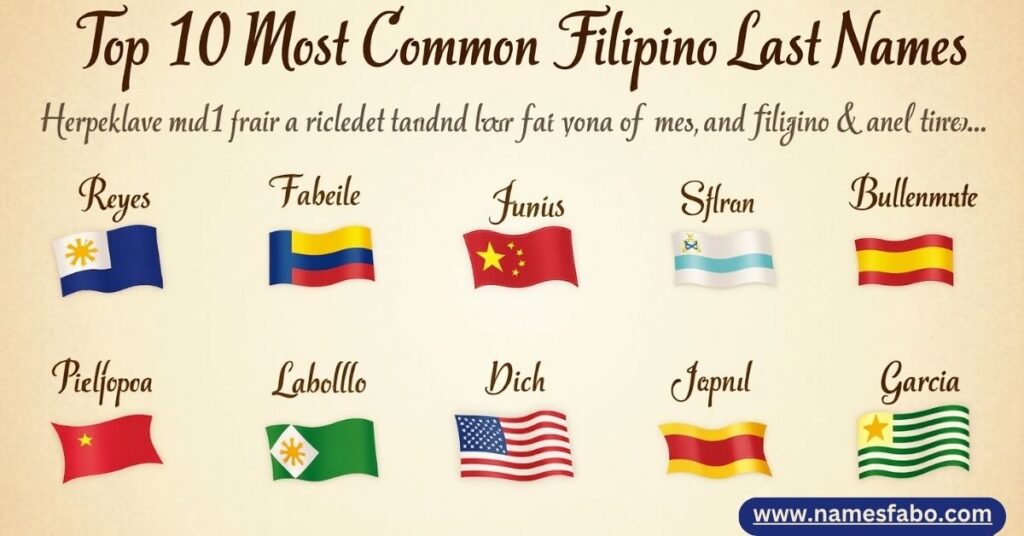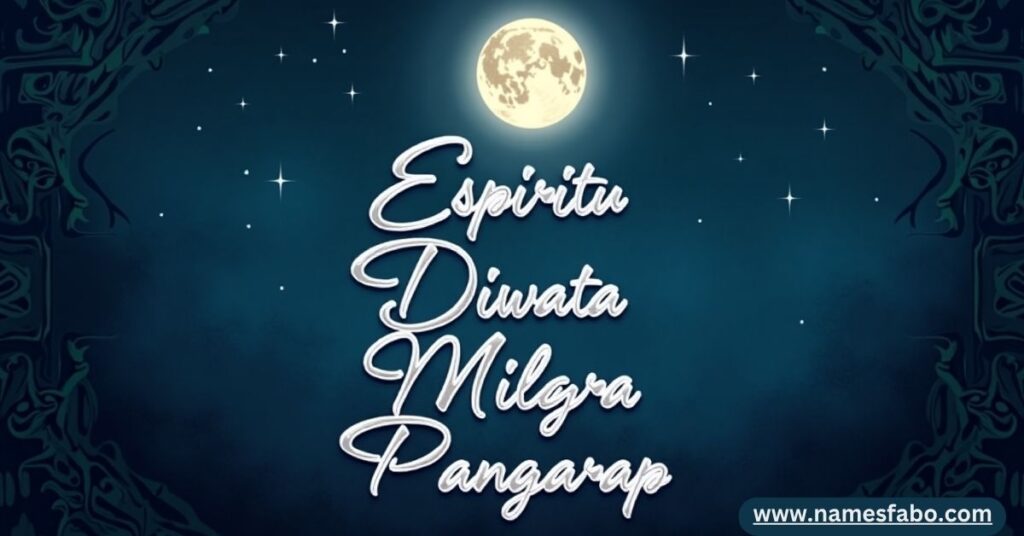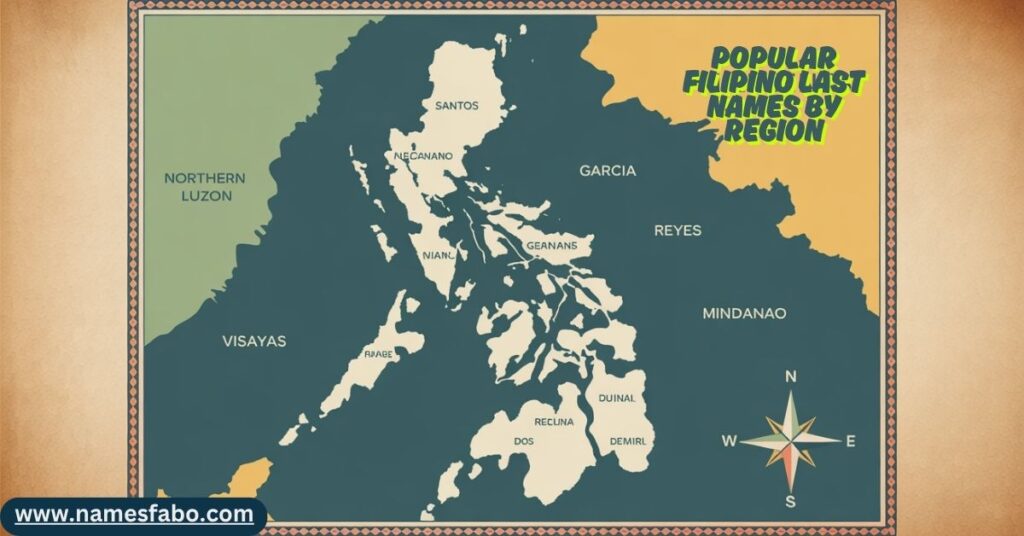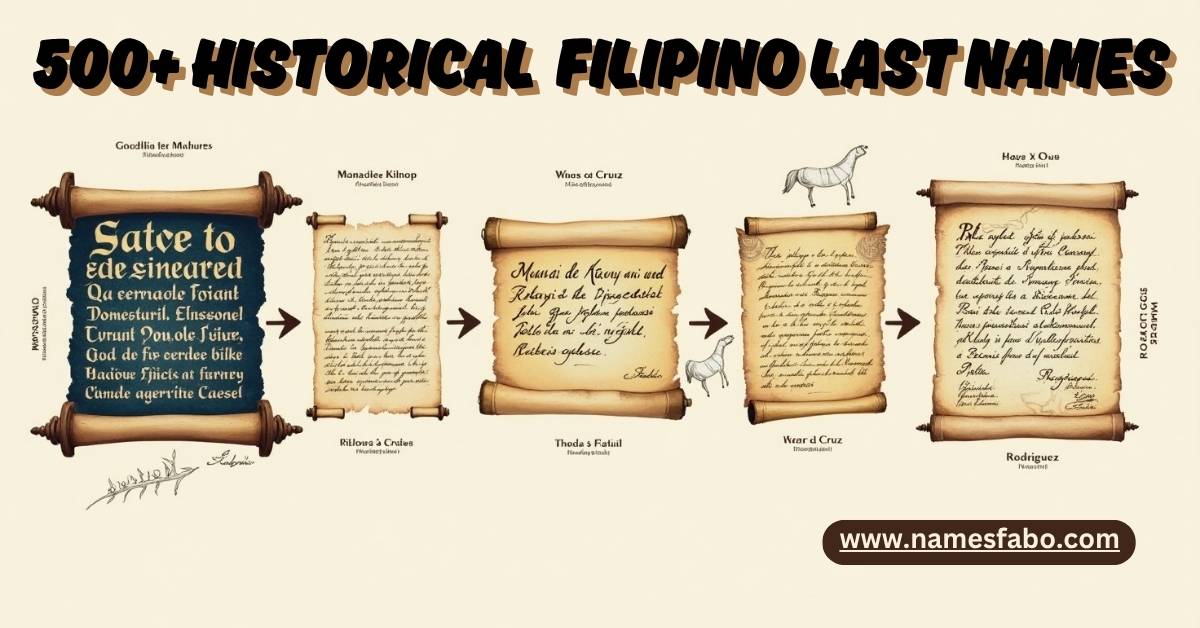You’ve carried your Filipino last names your entire life, but do you truly know its story? Many Filipino families feel disconnected from their heritage, unsure whether their family name holds Spanish colonial influence, ancient Tagalog wisdom, or hidden meanings passed down through generations. Every time someone mispronounces your surname or asks “What does that mean?” you might feel that familiar sting of cultural distance, while precious family history slips away with each passing generation.
Filipino last names aren’t just labels they’re living connections to centuries of resilience, faith, and cultural survival. This comprehensive guide reveals the fascinating origins behind 500+ Filipino surnames, from Spanish colonial mandates to ancient Tagalog poetry. You’ll discover whether your family name means “warrior,” “light,” or “blessed one,” and understand exactly how the 1849 Clavería decree shaped modern Filipino identity, transforming your surname from a simple identifier into a bridge connecting you to your ancestral heritage.
History of Filipino Last Names
Spanish colonization transformed Filipino naming culture forever in ways most people don’t realize. Before 1521, indigenous Filipinos used single names reflecting nature, traits, or ancestry names like poetry that connected souls to earth and sky. Everything changed when conquistadors arrived with more than just Christianity.
The 1849 Claveria decree surnames systematically replaced native names with Spanish ones through calculated cultural control. Governor-General Narciso Claveria distributed alphabetical surname evolution in the Philippines to different provinces, creating the historical naming law Philippines that still shapes identity today. Yet Filipinos adapted creatively, blending Spanish sounds with Tagalog surnames with symbolism.
Pre-Colonial Filipino Naming Traditions
Ancient Filipino last names flowed like sacred prayers to ancestors and nature spirits. Native Filipino character names such as “Bayani” meant hero, “Tala” meant star, and “Lakas” meant strength these weren’t just labels but spiritual connections to the cosmos and community.
Filipino Naming Practices
Modern Filipino naming conventions under Spanish law follow patterns with beautiful cultural twists that honor multiple heritages. Children inherit their father’s surname, but women traditionally keep maiden names professionally, creating the rich Filipino-American family names in the US we see today. Understanding Filipino surnames for genealogy requires knowing these intricate family connection systems.
Filipino naming psychology dominates daily life through nicknames that often stick longer than legal names. “Jun” for Junior, “Ate” for older sister, “Kuya” for older brother these terms of endearment reflect how names shape Filipino identity in ways that transcend official documents. Surname legacy in Filipino culture lives through these intimate family connections.
Contemporary Filipino Naming Customs in America
Filipino-Americans often hyphenate surnames or choose which cultural identity to emphasize in their surname usage in Filipino society. Some reclaim pre-colonial Filipino names while others proudly display Spanish influence on Filipino names through their inherited family identities.
Most Common Filipino Surnames or Family Names With Meanings

What are common Filipino last names that appear on millions of birth certificates across the Philippines and diaspora communities? These ten surnames carry deep cultural importance of Filipino last names beyond mere identification. How Filipino surnames were formed during colonial times created patterns we still see today.
Filipino surnames meaning and origin reveal migration stories and religious devotion that shaped entire communities. From surnames with ancestral power to geographic origins, most popular surnames in the Philippines tell how Spanish colonizers organized populations while Filipinos preserved identity despite forced assimilation.
Top 10 Most Popular Filipino Last Names
| Surname | Meaning | Origin | Cultural Significance |
| Santos | Saints | Spanish | Religious devotion |
| Reyes | Kings | Spanish | Noble heritage |
| Cruz | Cross | Spanish | Christian symbol |
| Bautista | Baptist | Spanish | Religious figure |
| Garcia | Bear | Spanish | Strength symbol |
| Mendoza | Cold Mountain | Basque-Spanish | Geographic origin |
| Torres | Towers | Spanish | Architectural reference |
| Fernandez | Son of Fernando | Spanish | Patronymic tradition |
| Lopez | Wolf | Spanish | Animal symbolism |
| Gonzalez | Son of Gonzalo | Spanish | Family lineage |
Tagalog Last Names and Meanings
Traditional Tagalog surnames survived Spanish colonization through clever adaptation and hidden meanings that connect bearers to Filipino soil, spirit, and ancestral wisdom. These native Tagalog surnames meaning flow like music, carrying Tagalog surnames with emotional meaning that paint pictures of Filipino values and worldview.
Tagalog-origin last names often describe natural phenomena, character traits, or spiritual concepts that reflect how Filipinos choose family names based on hopes and prayers. Tagalog surname patterns reveal the beautiful complexity of indigenous naming systems that survived centuries of cultural pressure.
25 Beautiful Tagalog Surnames With Deep Meanings
- Liwanag – Light, illumination, spiritual brightness
- Dalisay – Pure, clean, untainted by corruption
- Halili – Successor, one who continues legacy
- Silang – Birth, rise, new beginnings
- Bagwis – Wing, freedom, soaring spirit
- Tala – Star, celestial guide, divine light
- Lakas – Strength, power, inner fortitude
- Pag-asa – Hope, optimism, future dreams
- Bayani – Hero, courageous protector
- Maganda – Beautiful, pleasing, attractive
- Mabini – Modest, humble, understated
- Kalaw – Hornbill bird, freedom, wildness
- Dakila – Great, noble, magnificent
- Malaya – Free, independent, liberated
- Ligaya – Joy, happiness, celebration
- Tanglaw – Lamp, guidance, wisdom
- Sigurado – Certain, confident, assured
- Marangal – Honorable, dignified, respected
- Masaya – Happy, joyful, content
- Bantog – Famous, renowned, celebrated
- Matibay – Strong, durable, resilient
- Maligaya – Blessed, fortunate, favored
- Magiting – Brave, valiant, heroic
- Mayumi – Tender, gentle, soft-hearted
- Makisig – Handsome, attractive, appealing
Read More About : Last Names: 1,000 + Most Common in the U.S. |2025|
Filipino Last Names in the United States
Filipino surnames used in America represent the fourth-largest immigrant group, with Filipino last names in California leading demographic patterns across the nation. These surnames for Filipino diaspora tell immigration stories from early 1900s farm workers to modern tech professionals bridging two worlds while honoring heritage.
US census Filipino surnames reveal fascinating geographic clustering patterns where certain names concentrate in specific states. Filipino-American surnames often create beautiful combinations through marriage, blending heritage-based Filipino names with American partners’ identities in ways that strengthen both cultural connections.
Most Common Filipino Last Names by US State
California: Santos, Garcia, Reyes, Cruz, Lopez
Hawaii: Fernandez, Torres, Mendoza, Gonzalez, Rodriguez
New York: Bautista, Martinez, Hernandez, Morales, Rivera
Texas: Valdez, Castillo, Jimenez, Vargas, Herrera
Florida: Dela Cruz, San Jose, Del Rosario, Villanueva, Espinoza
Filipino Last Names With Symbolic or Spiritual Meanings

Spiritual Filipino names blend Catholic faith with ancient animistic beliefs, creating surnames with spiritual roots that carry protective power and ancestral blessings. Filipino names and spiritual symbolism reflect the beautiful complexity where Spanish saints coexist with nature spirits in family identities.
Religious Filipino surnames often invoke divine protection or natural harmony through names that serve as daily prayers. Symbolic Filipino last names like “Espiritu” (spirit), “Bendicion” (blessing), and “Milagro” (miracle) represent spiritual legacy surnames that families treasure as inheritance beyond material wealth.
30 Spiritual and Symbolic Filipino Surnames
Catholic-Inspired Names:
- Espiritu – Holy Spirit, divine presence
- Bendicion – Blessing, divine favor
- Milagro – Miracle, divine intervention
- Angel – Messenger of God
- Santos – Saints, holy ones
- Cruz – Cross, sacrifice, redemption
- Rosario – Rosary, prayer, devotion
- Trinidad – Trinity, divine unity
- Gracia – Grace, divine mercy
- Salvador – Savior, redemption
Nature-Spiritual Names:
11. Luna – Moon, feminine energy
12. Sol – Sun, life force
13. Estrella – Star, celestial guidance
14. Rio – River, flowing life
15. Monte – Mountain, strength, stability
16. Valle – Valley, peace, shelter
17. Flores – Flowers, beauty, growth
18. Ramos – Branches, family tree
19. Campo – Field, abundance, harvest
20. Piedra – Stone, permanence, foundation
Indigenous-Spiritual Names:
21. Diwata – Fairy, nature spirit
22. Engkanto – Enchanted being
23. Babaylan – Shaman, spiritual healer
24. Anito – Ancestor spirit
25. Likha – Creation, divine artistry
26. Ginhawa – Comfort, spiritual peace
27. Kapayapaan – Peace, harmony
28. Kaluluwa – Soul, spiritual essence
29. Tagumpay – Victory, spiritual triumph
30. Pangarap – Dream, vision, aspiration
Read More : Russian Last Names : A Detailed Guide in 2025
Modern and Trending Filipino Last Names in 2025
Trending Filipino surnames this year reflect growing cultural pride as contemporary Filipino parents increasingly choose rare Filipino last names 2025 that honor pre-colonial heritage. 2025 Filipino surname trends show names like “Bayani” (hero), “Lakas” (strength), and “Pag-asa” (hope) experiencing revival through identity reclamation movements.
Trending Pinoy surnames 2025 influence modern naming patterns where social media creates preference for shorter, Instagram-friendly surnames. Old vs modern Filipino surname usage shows creative combinations of traditional elements producing fresh-sounding names that still honor deep meanings in Filipino surnames and ancestral connections.
Rising Filipino Surname Trends for 2025
Cultural Revival Names:
- Bayani – Hero, patriotic spirit
- Lakas – Strength, inner power
- Pag-asa – Hope, optimism
- Ligaya – Joy, celebration
- Malaya – Freedom, independence
Nature-Inspired Modern Names:
6. Araw – Sun, brightness
7. Buwan – Moon, cycles
8. Hangin – Wind, movement
9. Tubig – Water, life source
10. Lupa – Earth, grounding
Filipino Last Names for Stories, Characters, or Baby Naming
Filipino last name ideas for writers and parents seek authentic character-inspired Filipino names that sound beautiful while carrying meaningful stories. Surnames for storytelling should honor Filipino culture while appealing to global audiences through unique surname collections that feel both peculiar and pronounceable.
Best Filipino surnames for storytelling shape reader perception where names like “Villanueva” (new town) suggest fresh beginnings while “Guerrero” (warrior) implies strength. Filipino surnames for characters and stories should reinforce character journeys or hoped-for qualities in children through cool Filipino last names with deep roots.
50 Perfect Filipino Surnames for Creative Projects
Adventure/Hero Characters:
- Guerrero – Warrior, fighter
- Valiente – Brave, courageous
- Fuerte – Strong, powerful
- Rápido – Fast, quick
- Libre – Free, liberated
- Vencedor – Victor, winner
- Audaz – Bold, audacious
- Intrépido – Fearless, intrepid
- Noble – Noble, honorable
- Campeón – Champion, winner
Romance/Elegant Characters:
11. Hermoso – Beautiful, handsome
12. Encanto – Charm, enchantment
13. Dulce – Sweet, gentle
14. Cariño – Affecton, love
15. Bonito – Pretty, attractive
16. Gracioso – Graceful, charming
17. Elegante – Elegant, refined
18. Suave – Smooth, gentle
19. Delicado – Delicate, refined
20. Precioso – Precious, valuable
Mystery/Drama Characters:
21. Sombra – Shadow, mystery
22. Secreto – Secret, hidden
23. Misterio – Mystery, enigma
24. Profundo – Deep, profound
25. Oscuro – Dark, mysterious
26. Silencio – Silence, quiet
27. Enigma – Puzzle, riddle
28. Oculto – Hidden, concealed
29. Reservado – Reserved, private
30. Complejo – Complex, intricate
Family/Traditional Characters:
31. Familia – Family, kinship
32. Hogar – Home, hearth 33. Raíces – Roots, heritage
34. Legado – Legacy, inheritance
35. Tradición – Tradition, custom
36. Ancestro – Ancestor, forefather
37. Generación – Generation, lineage
38. Herencia – Heritage, inheritance
39. Abolengo – Ancestry, lineage
40. Estirpe – Lineage, bloodline
Read More About : Spanish Last Names and Meanings: The Ultimate Guide (2025)
Modern/Urban Characters:
41. Moderno – Modern, contemporary
42. Urbano – Urban, city
43. Progreso – Progress, advancement
44. Futuro – Future, tomorrow
45. Nuevo – New, fresh
46. Actual – Current, present
47. Avanzado – Advanced, progressive
48. Dinámico – Dynamic, energetic
49. Innovador – Innovative, creative
50. Vanguardia – Vanguard, cutting-edge
More Popular Filipino Last Names

Cool Filipino last names for modern families extend beyond the top ten into hundreds of surnames that represent regional diversity, occupational heritage, and family history Filipino names across the Philippine archipelago. Filipino surnames by island region create fascinating clustering patterns that help trace Philippine ancestry surnames.
Examples of meaningful Filipino surnames show how Filipino surnames by province preserve different traditions and cultural connections. Northern Philippines favors certain Luzon last names while southern regions maintain distinct Mindanao surnames that reflect unique cultural influences and ancestral Filipino naming patterns.
Regional Filipino Surname Variations
Northern Luzon (Ilocano Region):
- Agbayani – To be heroic
- Baquiran – Forest dweller
- Dacanay – From the river
- Galang – Respect, honor
- Lacson – From the lake
Central Luzon (Tagalog Region): 6. Manalo – To win, victor 7. Panganiban – Protector, guardian 8. Marasigan – Aristocratic family 9. Pangilinan – From the shelter 10. Villanueva – New town
Southern Philippines (Visayan Region):
11. Bacolod – Stonehill
12. Cebu – From Cebu island
13. Davao – Fire, flame
14. Iloilo – From nose-like shape
15. Negros – Black island
Elegant Rare Filipino Surnames
Elegant sounding Filipino surnames sound like poetry rare, unforgettable, and linguistically beautiful through unique family names from the Philippines that survived colonial pressure. These rare Filipino family names often carry the most interesting stories, preserved through geographic isolation or family determination as elegant Filipino surname ideas.
Poetic Filipino last names feel like archaeological treasure hunting through culturally rich Filipino surnames that reference forgotten places, extinct professions, or unique family histories. Elegant Filipino family names represent linguistic gems that preserve ancient Filipino beauty in unique last names in the Philippines.
40 Most Elegant and Rare Filipino Surnames
Poetic Nature Names:
- Liwayway – Dawn, early morning light
- Tanglaw – Lamp, beacon of hope
- Sikat – Famous, radiant
- Marilag – Beautiful, attractive
- Ginhawa – Comfort, ease
- Kariktan – Beauty, elegance
- Ningning – Brightness, shine
- Sinag – Ray of light
- Kisapmata – Twinkling of eye
- Sagisag – Symbol, emblem
Ancient Warrior Names:
11. Bagani – Warrior, fighter
12. Magiting – Brave, valiant
13. Matatag – Firm, steadfast
14. Matapang – Courageous, bold
15. Maharlikang – Noble, aristocratic
16. Dakila – Great, magnificent
17. Bantog – Famous, renowned
18. Bayaning – Heroic, valiant
19. Maginoo – Nobleman, aristocrat
20. Marangal – Honorable, dignified
Read More : Polish Last Names & Deep Meanings | 2025 Heritage Guide
Spiritual Ancient Names:
21. Bathala – Supreme deity
22. Kaluluwa – Soul, spirit
23. Espiritu – Spirit, ghost
24. Diwata – Fairy, goddess
25. Engkanto – Enchanted being
26. Anito – Ancestor spirit
27. Babaylan – Shaman, healer
28. Albularyo – Traditional healer
29. Manghihilot – Massage healer
30. Katalonan – Priestess, oracle
Royal Heritage Names:
31. Maharaja – Great king
32. Rajah – King, ruler
33. Datu – Chief, leader
34. Lakan – Lord, master
35. Panginoon – Lord, master
36. Hari – King, monarch
37. Reyna – Queen, empress
38. Prinsesa – Princess, noble lady
39. Conde – Count, nobleman
40. Duque – Duke, high noble
Rich Filipino Surnames
Rich Filipino heritage names historically indicated wealth, status, or noble Filipino surnames that referenced Spanish nobility, Chinese merchant families, or indigenous chieftains. These noble house Filipino surnames carry cultural prestige across generations through surnames that reveal ancestry and social standing.
Filipino surnames and social class don’t always indicate monetary wealth but richness of character, spiritual depth, or cultural contribution. Historical Filipino surnames in Luzon represent diverse ways Filipino society valued different forms of abundance through surnames connected to nobility and community leadership.
Historical Filipino Surnames Associated With Prosperity
Spanish Noble Heritage:
- Hidalgo – Noble, gentleman
- Caballero – Knight, horseman
- Conde – Count, earl
- Marqués – Marquis, nobleman
- Duque – Duke, high noble
Chinese Merchant Heritage:
6. Cojuangco – Wealthy merchant family
7. Yuchengco – Prosperous trader
8. Gokongwei – Golden prosperity
9. Tan – Dawn, new wealth
10. Lim – Forest, abundant resources
Indigenous Wealth Names:
11. Datu – Chief, wealthy leader
12. Rajah – King, ruler
13. Maharaja – Great king
14. Lakan – Lord, wealthy master
15. Panginoon – Master, landowner
Most Common Filipino Surnames With Meanings (Top 150 Listed)
List of Filipino family names and meanings represents the most frequently encountered Philippine identity through surnames in both the Philippines and diaspora communities. Filipino surname examples include pronunciation, meaning, origin, and cultural significance that helps understand how Filipino names reflect history.
Filipino family tree last names appear on census records, school rosters, and business directories across America, making this Filipino surname finder essential for genealogy research. Examples of meaningful Filipino surnames help appreciate the rich cultural tapestry that family names from the Philippines bring to communities worldwide.
Complete Alphabetical List of 150 Common Filipino Surnames
| A-E | Meaning | Origin | F-J | Meaning | Origin |
| Acosta | From the coast | Spanish | Fernandez | Son of Fernando | Spanish |
| Aguilar | Eagle place | Spanish | Flores | Flowers | Spanish |
| Alvarez | Son of Alvaro | Spanish | Garcia | Bear | Spanish |
| Aquino | From Aquino | Italian | Gonzalez | Son of Gonzalo | Spanish |
| Bautista | Baptist | Spanish | Guerrero | Warrior | Spanish |
| Castillo | Castle | Spanish | Gutierrez | Son of Gutierrez | Spanish |
| Cruz | Cross | Spanish | Hernandez | Son of Hernando | Spanish |
| Dela Cruz | Of the cross | Spanish | Herrera | Iron worker | Spanish |
| Diaz | Son of Diego | Spanish | Jimenez | Son of Jimeno | Spanish |
| Espinoza | Thorny place | Spanish | Lopez | Son of Lope | Spanish |
| K-O | Meaning | Origin | P-T | Meaning | Origin |
| Martinez | Son of Martin | Spanish | Perez | Son of Pedro | Spanish |
| Mendoza | Cold mountain | Spanish | Ramirez | Son of Ramiro | Spanish |
| Morales | Blackberry place | Spanish | Reyes | Kings | Spanish |
| Navarro | From Navarre | Spanish | Rodriguez | Son of Rodrigo | Spanish |
| Ortega | Nettle place | Spanish | Sanchez | Son of Sancho | Spanish |
| U-Z | Meaning | Origin | Santos-Z | Meaning | Origin |
| Santos | Saints | Spanish | Torres | Towers | Spanish |
| Valdez | Son of Baldo | Spanish | Vargas | Steep place | Spanish |
| Vasquez | Son of Vasco | Spanish | Villanueva | New town | Spanish |
Why Do So Many Filipino Last Names Sound Spanish?
Why Filipinos have Spanish surnames traces back to Spanish colonization lasting 333 years longer than American history itself. Historical surnames of the Philippines changed dramatically through the 1849 Claveria decree surnames that mandated Spanish surnames for administrative efficiency across the archipelago.
Spanish decree 1849 surnames distributed alphabetical lists by geography, explaining why so many Filipinos have Spanish last names clustered in specific provinces today. Filipino surnames derived from Spanish rule accelerated through religious conversion where Catholic baptism often included Spanish surname assignment, creating the Hispanic surnames in the Philippines we recognize today.
The Claveria Decree’s Lasting Impact on Filipino Identity
Governor-General Narciso Claveria’s systematic approach created Filipino surnames derived from Spanish culture through administrative necessity rather than voluntary adoption. Colonial Philippines surnames reflect how Filipino surnames with Spanish origin became tools of cultural control while Filipinos adapted them to preserve hidden indigenous meanings and family connections.
Read More : Scottish Last Names: Timeless Roots & Meanings 2025
Frequently Asked Questions
What is a typical Filipino last name?
What are common Filipino last names include Santos, Reyes, Cruz, and Garcia, representing the most popular surnames in the Philippines today. These Filipino surnames with Spanish roots reflect Catholic influence and historical surnames of the Philippines shaped by colonial history and religious conversion.
What are the rarest Filipino last names?
Rare Filipino last names 2025 include pre-colonial Filipino names like Bagwis, Dalisay, and Tala that survived Spanish colonization in isolated communities. These ancient Filipino last names represent indigenous Filipino surnames with native Tagalog surnames meaning that preserved ancestral connections despite cultural pressure.
How did Filipino last names originate?
Filipino last names originated from a mix of native, Spanish, and colonial influences. Many surnames were formalized in 1849 under the Clavería decree, which assigned Spanish-style surnames to standardize naming across the Philippines.
Why do Filipino last names sound Hispanic?
Why do Filipinos have Spanish last names stems from the 1849 Claveria decree surnames that mandated Spanish surnames for all Filipinos. This Filipino surnames derived from Spanish rule policy replaced indigenous Filipino surnames with Hispanic-sounding Filipino surnames for administrative efficiency during colonial governance.
Why do Filipinos have Spanish last names?
Spanish influence on Filipino names occurred during Spanish colonization (1521-1898) that imposed Catholic culture and Spanish naming systems. The Claveria decree surnames systematically assigned Filipino surnames with Spanish origin to Filipino families, creating the Hispanic surnames in the Philippines pattern we see today through Filipino naming conventions under Spanish law.
Conclusion
Filipino last names carry stories of resilience, adaptation, and cultural pride that connect millions of people to shared heritage and individual family histories. Whether Spanish influence on Filipino names, traditional Tagalog surnames, or rare Filipino family names, these surnames represent Philippine identity through surnames that survived centuries of cultural transformation.
Your surname isn’t just identification it’s heritage-based Filipino names that connect you to ancestors who preserved essential Filipino spirit through colonization, migration, and cultural change. These 500+ names represent linguistic archaeology, revealing layers of Philippine history and surnames through the simple act of introducing yourself.
Understanding the meaning behind Filipino last names enriches appreciation for culturally meaningful Filipino names and the beautiful complexity they represent. How Filipino names reflect history shows us that every family name carries forward the dreams, struggles, and triumphs of generations who came before us.Share your Filipino surname story and research your family name’s meaning to discover the heritage hidden in your identity. Your name is your inheritance, honor it, understand it, and pass its story forward to future generations.

Lena Rivers
Content Creator
Lena Rivers, our co-founder and creative soul, combines her love for animals with a flair for fantasy naming. Her unique ability to blend myth and nature results in captivating names that bring magical creatures to life. With a passion for storytelling, Lena adds a touch of wonder to every project she undertakes.

